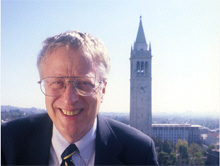
Typical street scene in Santa Ana, El Salvador. (Photo: iStock)
IMF Survey: Economics Nobel George Akerlof Takes up Research Job at IMF
October 8, 2010
- Says topic that has motivated him most over his career is unemployment
- Applauds attention IMF has given in recent months to unemployment crisis
- Hopes to help with design of financial regulation, controlling systemic risk
If you play a game of word association with an economics Ph.D and say “Akerlof”, chances are the response will be “lemons”.

Akerlof: “Many ordinary people did not understand the liabilities they were taking on when they were buying homes” (photo: Peg Skorpinski/UC Berkeley)
SENIOR RESIDENT SCHOLAR
Indeed, George Akerlof is best known for his work showing how markets break down when the two parties entering a transaction have unequal information. The example Akerlof gave was of used car markets where the seller has better knowledge of whether his car is a “lemon.”
Problems of unequal—‘asymmetric’ in the jargon of economists—information are present in most markets, particularly in financial markets. “This crisis gave us glaring examples,” says Akerlof, who joined the IMF’s Research Department as a senior resident scholar on October 4. He won the Nobel Prize for Economics in 2001.
“Many ordinary people did not understand the liabilities they were taking on when they were buying homes, just as many purchasers of complex securities failed to understand the risks they were taking. There was a naïve kind of asymmetric information that has turned out to be of surprising importance.” Akerlof hopes to help IMF staff with the post-crisis design of financial regulation and on issues of how to bring systemic risk under control.
Unemployment: Losing more than an income
While the work on asymmetric information won him the Nobel, Akerlof says the topic that has motivated him the most over his career is unemployment. It was the subject of his first published paper and he has returned to it numerous times since then. “I have always thought of unemployment as a terrible thing,” he says. “In fact that has been the motivation for almost everything I have ever written. A person without a job loses not just his income but often the sense that he is fulfilling the duties expected of him as a human being.”
Akerlof therefore applauds the attention that the IMF has given in recent months to the unemployment crisis. IMF Managing Director Dominique Strauss-Kahn said in a press conference ahead of the 2010 IMF-World Bank Annual Meetings that “growth without jobs doesn’t mean much for the man in the street. So obviously, for us, the crisis will not be over until the unemployment rate decreases significantly.”
But given high debt-to-GDP ratios in many countries, Akerlof says that “fiscal stimulus [to lower unemployment] has to be used wisely.” Only policies with “the highest multipliers, the biggest bang for the buck” in terms of terms of their economic impact should be adopted.
Akerlof says that trying to understand unemployment—“why supply doesn’t always equal demand in labor markets”—also helped him think in a more broad-minded way about how “people, organizations, markets, and capitalism” really work. This creative thinking is reflected in Akerlof’s 2009 book Animal Spirits, written jointly with Yale University economist Robert Shiller. The book was shortlisted for the 2009 Financial Times/Goldman Sachs Business Book of the Year Award.
The role of fairness, confidence
In the book, Akerlof and Shiller demonstrate how forces that are not normally considered in orthodox economics, such as confidence and fairness, are critical to understanding why economies fall into depression, why there is unemployment, and why asset markets are so volatile.
To illustrate the role that fairness plays, Akerlof says that “companies are reluctant to hire people at wages that they think people will consider unfair.” But the wages that get set when fairness is a consideration could be higher than the wage at which employers would want to hire all those who are seeking jobs; hence there will be some unemployment.
Confidence plays a dual role. Overconfidence can spur excessive and foolish investment, for instance in housing markets. But then in a recession, loss of confidence can cause an over-reaction in the other direction, leading credit to dry up. “Again,” says Akerlof, “we come back to the role of stimulus spending. Well designed [fiscal] policies can create a confidence multiplier” to get the economy back on track.
Olivier Blanchard, the IMF’s Economic Counsellor and Director of Research, says that "having George in our midst would be a boon at any time. But his presence is particularly welcome at the moment, when the Fund needs creative thinking on many fronts, from tackling the unemployment crisis to the design of financial regulation."


